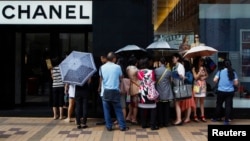While China's government censors domestic coverage of the growing Hong Kong democracy movement, some mainland Chinese are entering Hong Kong specifically to learn about the nuances of protesting for democratic and civil rights.
Each year, more than 30 million mainland Chinese cross the border into Hong Kong. Usually, they come on business or to shop. This week, during China’s three-day National Day holiday, many are faced with an unexpected sight: tens of thousands of Hong Kong citizens protesting for universal suffrage, camped outside the stores and restaurants they might frequent.
A businessman from Guangdong, just across the border, was too nervous to give his name. But he told VOA he did not have the slightest clue what the Hong Kong people were up to.
Such a lack of awareness is hardly surprising since reporting of the Hong Kong democracy movement is restricted in China. However, in the protest camps VOA encountered several mainland visitors who were better informed.
Electronic engineer Stewart Sze said he learned about the democracy movement by using a virtual private network to get around the so-called Great Firewall of China, which prevents Chinese citizens viewing media content that Beijing deems unsuitable.
“I am a supporter of the students because they recognize very clearly what is national and what is government. I think they are against our government, not against our country. It’s a very important democratic activity," he said.
Hong Kong protesters were an inspiration, said Sze, who knows of other mainlanders now in Hong Kong to observe and learn from the Occupy Central movement.
“Actually, I thank the Hong Kong people very much because they practice democratic activities in China. Taiwan has democratic practices but, in China’s mainland, this is the only city you can do such things,” he said.
Speaking on the 65th anniversary of the creation of the People’s Republic of China, Sze added that he did not fear arrest on his return home to Shandong. Nor, though, is he confident of witnessing democracy elsewhere in China during his own lifetime.








